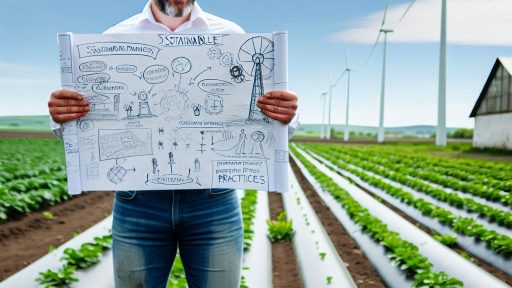Understanding the Importance of Animal Welfare in Agriculture
The Ethical Obligation to Animals
Farm animals deserve humane treatment and respect.
The ethical obligation to care for them leads to responsible farming practices.
Farmers have a duty to ensure the well-being of all animals on their farms.
Furthermore, ethical treatment enhances the social responsibility of the agriculture sector.
The Economic Benefits of Animal Welfare
Ensuring high standards of animal welfare can increase productivity.
Healthy animals are more productive and yield better outputs.
Additionally, improving welfare can enhance product quality.
By implementing better welfare practices, farmers can also improve their market reputation.
Regulatory Compliance and Public Expectations
Compliance with animal welfare laws is not just legal; it’s ethical.
Many countries have stringent regulations regarding animal care.
Public awareness of animal welfare issues influences consumer behavior.
Consumers increasingly prefer products from welfare-friendly farms.
Implementing Best Practices for Animal Welfare
Farmers should adopt practices that prioritize animal comfort and well-being.
Regular health check-ups and vaccinations are essential.
Providing adequate space and social interaction among animals fosters better welfare.
Transform Your Agribusiness
Unlock your farm's potential with expert advice tailored to your needs. Get actionable steps that drive real results.
Get StartedMoreover, training staff on animal handling promotes humane treatment.
The Role of Technology in Improving Animal Welfare
Innovations in technology can support better welfare practices.
Monitoring systems enable farmers to track animal health and behavior.
Data-driven solutions provide insights for improving living conditions.
Furthermore, technology can enhance traceability in the food supply chain.
Overview of Animal Welfare Laws and Regulations
Understanding Animal Welfare
Animal welfare refers to the well-being of animals under human care.
It encompasses various aspects, including housing, nutrition, and healthcare.
Ensuring proper animal welfare is essential in agriculture.
Farm animals deserve humane treatment throughout their lives.
Key Legislation in Animal Welfare
Multiple laws govern the treatment of farm animals in the United States.
The Animal Welfare Act (AWA) sets standards for humane care.
It covers animals used in research, entertainment, and commerce.
Additionally, many states implement their own animal welfare laws.
Regulatory Bodies and Their Roles
Several organizations oversee animal welfare enforcement.
The United States Department of Agriculture (USDA) regulates animal health and welfare.
They conduct inspections of facilities to ensure compliance.
Moreover, the Animal and Plant Health Inspection Service (APHIS) plays a crucial role.
Common Regulations in Agriculture
Specific regulations focus on housing, feeding, and veterinary care.
Farm animals must have adequate living space and proper ventilation.
They should receive nutritionally balanced diets tailored to their needs.
Regular veterinary care is necessary to prevent and treat illnesses.
Importance of Compliance
Compliance with animal welfare laws is vital for ethical farming.
Ensuring animal welfare enhances public trust in agricultural practices.
Failure to comply can lead to legal penalties and reputational damage.
Showcase Your Farming Business
Publish your professional farming services profile on our blog for a one-time fee of $200 and reach a dedicated audience of farmers and agribusiness owners.
Publish Your ProfileMoreover, it promotes the sustainability of farming operations.
Advances in Animal Welfare Practices
Many farmers adopt innovative practices to improve animal welfare.
These practices include enriched environments and better handling techniques.
Additionally, technology aids in monitoring animal health and well-being.
Such advancements contribute to positive farming outcomes.
Key Stakeholders in Animal Welfare
Farmers
Farmers play a crucial role in animal welfare practices.
Their primary responsibility is to ensure the well-being of livestock.
Consequently, they must keep animals healthy and in suitable living conditions.
Furthermore, farmers need to stay informed about welfare laws.
Regular training programs can help farmers understand compliance requirements.
Effective communication with other stakeholders improves animal care.
Veterinarians
Veterinarians are essential in promoting animal welfare standards.
They provide medical care and prevent disease among livestock.
Additionally, veterinarians can offer guidance on housing and nutrition.
They assist farmers in implementing best practices for animal health.
Through their expertise, veterinarians influence farming practices positively.
Overall, their involvement ensures higher welfare outcomes.
Legislators
Legislators craft laws that govern animal welfare standards.
They establish the framework within which farmers and veterinarians operate.
By collaborating with various stakeholders, they can develop effective policies.
Additionally, legislators ensure that laws reflect current scientific knowledge.
Public advocacy can influence legislative priorities and animal welfare policies.
Therefore, engagement between all parties enhances compliance with welfare laws.
Explore Further: Renewable Energy Subsidies: A Farmer’s Comprehensive Guide
Best Practices for Meeting Animal Welfare Standards
Understanding Animal Welfare Laws
Animal welfare laws protect the rights and well-being of farm animals.
The regulations vary across regions but often share common principles.
Farmers must understand these laws to ensure compliance.
This knowledge helps to prevent legal issues and fines.
Regular Training for Staff
Training staff members is crucial for maintaining animal welfare standards.
Regular workshops keep employees informed about best practices.
In-house training fosters a culture of care among workers.
Every employee should understand their responsibilities regarding animal care.
Effective training includes practical demonstrations and evaluations.
Implementing Proper Housing Conditions
Housing plays a vital role in animal welfare.
Farmers must provide adequate space for animals to move freely.
Comfortable bedding is essential for the well-being of livestock.
Proper ventilation helps to maintain a healthy environment.
Regular inspections ensure that housing conditions meet regulations.
Ensuring Access to Clean Water and Nutrition
Animals require constant access to clean, fresh water.
Nutrition is equally important for their overall health.
Showcase Your Farming Business
Publish your professional farming services profile on our blog for a one-time fee of $200 and reach a dedicated audience of farmers and agribusiness owners.
Publish Your ProfileFarmers should work with veterinarians to develop balanced diets.
Monitoring animal weight can indicate nutritional adequacy.
Proper feeding schedules promote healthy growth and productivity.
Adopting Compassionate Handling Practices
Handling livestock gently reduces stress and improves welfare.
Farmers should learn low-stress handling techniques.
Compassionate interactions improve animals’ quality of life.
Regular assessments help identify any issues with handling practices.
Monitoring and Documentation
Keeping detailed records is essential for compliance with animal welfare laws.
Documentation should include data on animal health, nutrition, and housing.
Regular audits can identify areas for improvement.
Farmers must stay updated on the latest legal requirements.
Engaging with Animal Welfare Organizations
Collaboration with animal welfare organizations enhances knowledge and resources.
These organizations often provide valuable training and guidance.
Farmers can participate in workshops and seminars hosted by these groups.
Networking with other farmers fosters a community of shared best practices.
Discover More: Soil Conservation Rules Explained
Implementing Animal Welfare Training Programs for Farm Workers
The Importance of Animal Welfare Training
Animal welfare training is essential for all farm workers.
It ensures that employees understand the legal requirements.
Moreover, it promotes ethical treatment of animals on the farm.
This training reduces the risk of neglect or abuse.
Ultimately, it fosters a culture of responsibility among workers.
Creating Comprehensive Training Programs
Organizations must develop comprehensive training programs.
These programs should address all aspects of animal welfare.
Furthermore, they need to be tailored to specific animal species.
Inclusion of hands-on training enhances learning outcomes.
Providing ongoing education keeps workers informed of updates.
Key Components of the Training
Important components of the program include regulations and standards.
Workers should learn about humane handling and care techniques.
Additionally, the training should include emergency response protocols.
Training on recognizing signs of distress is crucial.
Workers must also understand the importance of proper nutrition.
Assessment and Feedback Mechanisms
Assessment methods are necessary to gauge training effectiveness.
Quizzes and practical demonstrations can be useful tools.
Feedback from participants helps refine the programs over time.
Moreover, regular evaluations ensure compliance with standards.
Staying adaptive promotes continuous improvement of training efforts.
Engaging the Farm Community
Engaging the entire farm community is vital for success.
Workshops and seminars encourage collaboration among workers.
Sharing best practices can enhance overall animal welfare.
Incentivizing participation fosters a positive learning environment.
Showcase Your Farming Business
Publish your professional farming services profile on our blog for a one-time fee of $200 and reach a dedicated audience of farmers and agribusiness owners.
Publish Your ProfileCreating a network of support promotes ongoing dialogue.
Learn More: Navigating Regulations Of Agricultural Conservation Programs

Monitoring and Auditing Compliance with Animal Welfare Regulations
Importance of Monitoring Compliance
Monitoring compliance is crucial for animal welfare in agriculture.
It helps identify potential areas of concern early on.
Regular monitoring ensures adherence to established regulations.
Farmers benefit from clear guidelines that promote best practices.
Methods for Monitoring
Various methods exist to monitor compliance effectively.
Some farms employ on-site inspections and checklists.
Others utilize technology to track animal welfare metrics.
Innovative apps can provide real-time data on animal conditions.
Benefits of Auditing Practices
Auditing practices reinforce compliance with animal welfare laws.
It promotes transparency in farming operations.
Audits can reveal whether farms meet acceptable standards.
This process encourages accountability among farmers.
Implementing an Effective Audit System
Setting up an effective audit system is essential.
First, establish clear criteria and expectations for audits.
Next, train staff on how to perform audits accurately.
Regular reviews of audit findings enhance improvement measures.
Collaboration and Support
Collaboration among farmers can enhance compliance efforts.
Peer support networks foster sharing of best practices.
Industry associations often provide valuable resources for compliance.
Furthermore, partnerships with animal welfare organizations can offer guidance.
Staying Informed on Regulations
Remaining informed about changing regulations is vital.
Updates can affect compliance requirements and standards.
Farmers should attend training sessions and workshops regularly.
Moreover, subscribing to industry newsletters keeps them informed.
Explore Further: The Importance of Food Safety Standards in Agriculture
The Role of Technology in Enhancing Animal Welfare Practices
Introduction to Technology in Agriculture
Technology plays a significant role in modern agriculture.
It enhances animal welfare practices across various farming operations.
This influence is crucial for improving compliance with animal welfare laws.
Monitoring and Tracking Systems
One of the main contributions of technology is the use of monitoring systems.
These systems enable farmers to track the health and behavior of animals.
For instance, wearable devices provide real-time data on animal conditions.
Consequently, farmers can promptly address any welfare concerns.
Data Analytics and Decision Making
Data analytics tools further enhance decision-making in agriculture.
They allow farmers to analyze patterns and trends in animal behavior.
By understanding these behaviors, farmers can improve living conditions.
As a result, animal stress levels can significantly decrease.
Automated Feeding and Care Systems
Automated systems for feeding and care bring additional benefits.
These systems ensure animals receive proper nutrition at all times.
Showcase Your Farming Business
Publish your professional farming services profile on our blog for a one-time fee of $200 and reach a dedicated audience of farmers and agribusiness owners.
Publish Your ProfileMoreover, they minimize human error in feeding routines.
Additionally, this automation enables consistent monitoring of health indicators.
Training and Education Technologies
Training technologies play a vital role in improving farming practices.
Online platforms provide resources for educating farmers on animal welfare standards.
Virtual reality simulations can offer hands-on experiences without actual risk.
Consequently, farmers become better equipped to handle welfare challenges.
Collaboration and Sharing of Best Practices
Technology enhances collaboration among farmers and organizations.
Online networks facilitate sharing of best practices in animal welfare.
Farmers can connect with experts for insights and guidance.
This collaborative approach strengthens compliance with welfare laws.
Sustainability and Ethical Considerations
Technology also promotes sustainability in farming operations.
Improved animal welfare aligns with ethical farming standards.
This alignment helps farmers meet consumer demands for humane practices.
Moreover, ethical considerations foster a positive public perception.
Case Studies: Successful Compliance Strategies in Agriculture
Innovative Approaches in Dairy Farming
Agricultural Enterprises implemented a comprehensive animal welfare program.
This program included regular training for all employees.
Additionally, they adopted advanced monitoring technologies.
As a result, animal welfare improved significantly.
Producers saw enhanced milk production and overall health.
Successful Implementations in Poultry Farms
Sunny Day Farms revamped their facilities to meet legal standards.
This included improving living conditions for chickens.
They ensured ample space and access to natural light.
As a result, egg production increased while waste management improved.
Furthermore, customer satisfaction ratings rose significantly.
Lessons Learned from Beef Cattle Operations
Green Pastures Beef Company adopted a holistic management approach.
They focused on animal health and environmental sustainability.
Regular health evaluations and nutrition assessments were conducted.
This led to healthier cattle and better meat quality.
Moreover, compliance with regulations became seamless.
Collaborative Efforts in Aquaculture
Blue Water Fishery initiated partnerships with local universities.
Researchers helped develop best practices for fish welfare.
Training sessions educated staff about sustainable methods.
The project significantly reduced mortality rates among fish.
Additionally, it attracted positive media attention for the farm.
Future Directions in Animal Welfare Compliance
These case studies highlight innovative strategies for compliance.
Such strategies lead to improved animal welfare and business success.
Future efforts must continue to prioritize both ethics and efficiency.
By investing in training and resources, farms can thrive.
Ultimately, a commitment to animal welfare benefits everyone involved.
Additional Resources
The Animal Welfare Act: Background and Selected Issues
Showcase Your Farming Business
Publish your professional farming services profile on our blog for a one-time fee of $200 and reach a dedicated audience of farmers and agribusiness owners.
Publish Your ProfileAnimal Policy & Regulatory Issues | Economic Research Service




